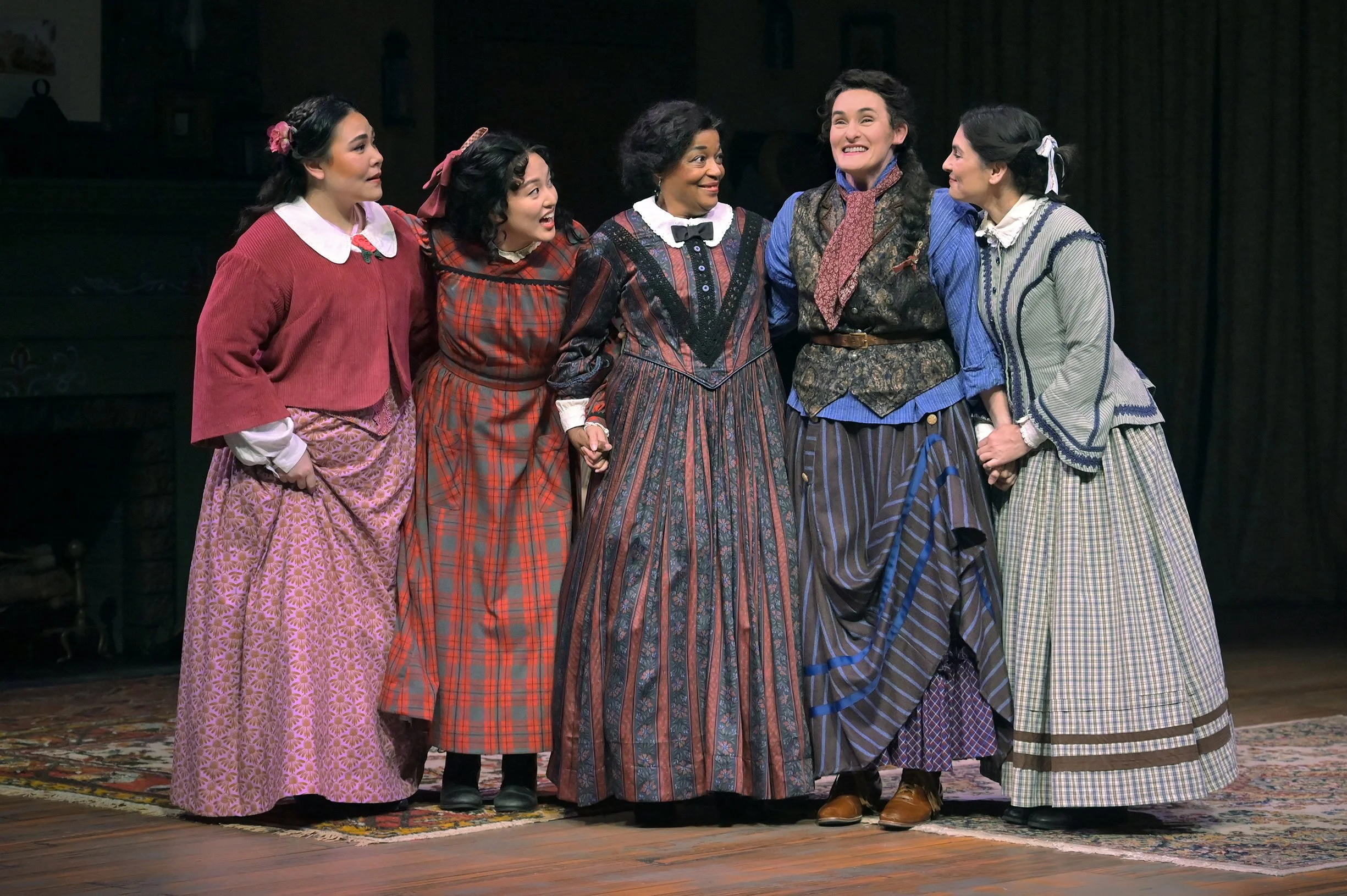New ‘Little Women’ delights at TheatreWorks
MARCH! The women of the March family (from left) Meg (Emily Ota), Amy (Sharon Shao), Marmee (Cathleen Riddley), Jo (Elissa Beth Stebbins) and Beth (Lauren Hart) in the TheatreWorks Silicon Valley's World Premiere of Louisa May Alcott's Little Women. Photo by Kevin Berne
“A good writer needs a good writer,” says a professor to an aspiring writer as he hands her a copy of Shakespeare’s collected works. Its’ an inspirational and romantic moment in Lauren Gunderson’s marvelous new adaptation of Louisa May Alcott’s perennially adapted Little Women. Gunderson, a former San Franciscan who has stormed the American theatrical scene to an astounding degree – she is frequently high on the list of the country’s most-produced playwrights – certainly doesn’t need a good writer to help her own work, but it sure has helped.
Gunderson is something of a specialist in turning great literature (think Jane Austen, William Shakespeare) into exciting new plays. Little Women is her latest adaptation, and it’s part of a rolling world premiere that, in addition to TheatreWorks of Silicon Valley, where it is currently delighting audiences, includes Pittsburgh’s City Theatre, Chicago’s Northlight Theatre and Pennsylvania’s People’s Light.
SUCH DEVOTED SISTER: Beth (center- Lauren Hart) is embraced by her sisters Jo (Elissa Beth Stebbins), Meg (Emily Ota) and Amy (Sharon Shao). Photo by Kevin Berne
There are many lovely adaptations of Alcott’s post-Civil War novel (actually the 1868 novel and its 1869 sequel) in film, musical theater and straight theater. The first stage adaptation was in 1912, and I can’t imagine it had nearly the zip and zing of Gunderson’s. She begins her version with Alcott herself (played by the same actor who will play Jo) explaining how she came to write a novel based on her own family. This conceit allows the story that follows to slip in and out of story theater in which the characters provide narration that extends beyond their dialogue. It’s a wonderful, writerly effect that continually reminds us that we are at once experiencing the story and having it told to us.
Director Giovanna Sardelli matches Gunderson’s narrative efficiency (with some judicious edits) with a small seven-person cast playing 10 characters on an effective and beautifully designed stage (by Annie Smart) that allows the family home to become a wide swath of locations with drapes and simple set pieces that allow for transition and visual variety. Just as gorgeous and character-defining are the plaid-heavy, texturally sumptuous costumes by Meg Neville.
Everything you might love about the original story is here, just more swiftly and succinctly presented, along with some sharp re-focusing to address some the issues that may still rankle readers more than 150 years into this story’s life.
Every iteration of this story hinges on Josephine “Jo” March, Alcott’s alter-ego who will find literary fame by writing about her family. Played here by Elissa Beth Stebbins, Jo is so crisply and enthusiastically drawn that we see every shade and color of her complexity as she matures over the course of the play from 15 to 25. We love her almost immediately, and that affection only grows with each chapter of her story. “I like good strong words that mean something,” she asserts, and everything about her is good and strong as well.
Her relationships with her sisters are overall very loving, but individually she is most respectful of Meg (Emily Ota), most tender with Beth (Lauren Hart) and most contentious with the baby of the family, Amy (Sharon Shao). Jo is clearly her own person and does not conform to society norms for a young lady being primed to be a wife. Jo wants adventure and success as a writer. Her emotions are outsize and her passions fierce. She is a marvel, and so is Stebbins.
THE BOY NEXT DOOR: Jo (Elissa Beth Stebbins) and Laurie (Max Tachis) are one of the great non-couple couples in American literature. Photo by Kevin Berne
With the introduction of the charismatic boy next door, Theodore “Laurie” Laurence (Max Tachis), Jo’s life is at once more vibrant and more complicated. The fact that Jo and Laurie seem destined for one another but don’t end up together has always been a bone of contention, but Gunderson does a superb job of illustrating just why (as Jo knows in her heart) they are better friends than romantic partners. When Jo does meet the man she will marry, Prof. Friedrich Bhaer (George Psarras), the path to their union feels more richly drawn and more soulful than it has in other adaptations. You don’t always root for them, but here you do.
Though the pace moves quickly, there’s not skimping on the more poignant aspects of the story, which really does have a genuine warmth that is powerfully conveyed here. It’s sentimental but not sappy, with the exception of Marmee (Cathleen Riddley), the doting mother who verges on the mawkish as she does in the book.
It doesn’t always feel like a compliment when you describe something as “heartwarming,” but that word applies here in a deeply satisfying way. Little Women has always been loved for the kindness, compassion and abundant love in its characters and its storytelling, and somehow, that mix within family and community feels poignant and necessary in ways, quite honestly, that surprised and overwhelmed me in the best possible way.
FOR MORE INFORMATION
Louisa May Alcott’s Little Women, adapted by Lauren Gunderson, continues through Oct. 12 in a TheatreWorks of Silicon Valley production at the Mountain View Center for the Performing Arts, 500 Castro St., Mountain View. Running time: 2 1/2 hours (including one 15-minute intermission). Tickets are $49-$109 (subject to change). Call 877-662-8978 or visit theatreworks.org.


